Cardinal Marc Ouellet, prefect of the Congregation for Bishops, is leading a symposium titled Toward a Fundamental Theology of the Priesthood at the Vatican through February 19, 2022.
In the lead-up to this event, I.Media spoke with the Canadian cardinal about what is at stake for the Church today.
Why did you choose to hold a symposium on the priesthood today?
Cardinal Ouellet: The Church is currently in a synodal process that raises the question of the participation of the People of God in the whole life of the Church. In launching the Synod on Synodality, the Pope does not wish to conduct a survey of opinions in the Church, a parliamentary operation or a collection of ideas. He wants to reawaken the faith of the People of God.
After the Synod on Young People and the one on Amazonia, we felt it was important to continue the reflection on the vocation of the baptized. The title of this symposium, Toward a Fundamental Theology of the Priesthood, shows that we wish to take up the subject of the priesthood by returning to its fundamentals: Christ and baptism.
Catholic culture has made us think of priests and bishops when we speak of priesthood. It’s as if they exhausted the subject. The Second Vatican Council restored the balance between the common priesthood of the baptized and the ministerial priesthood. But in practice, this has yet to unfold.
How can this balance be established?
Cardinal Ouellet: Missionary awareness should be present in all the baptized. The mission is not reserved for ordained ministers. The symposium therefore aims to return to the foundation of the priesthood, reflecting of course on the relationship between ordained ministry and baptismal priesthood. It’s not a question of focusing on the figure of the priest alone. We want to be attentive to the communion of vocations and to the complementarity of states of life; for example, how to exercise one’s baptismal priesthood as a parent, within a family, or in the consecrated life.
This symposium is taking place at a time in history when the figure of the priest has been damaged by the scandals of abuse committed by members of the clergy. Will the crisis of abuse be addressed in the reflections?
Cardinal Ouellet: The issue of abuse in the Church is a very difficult one. It has been studied extensively on a sociological and historical level, with studies by commissions giving a statistical view of the problem and pointing the finger at pastoral errors. The Church has come a long way in the last 25 years in recognizing the errors of the past in its handling of abuse cases in particular.
We have not finished the work of analyzing this crisis. Reflection needs to be carried out on a theological level, a task that commissions like CIASE (the French Independent Commission on Sexual Abuse in the Church, Ed.) have not been able to do fully. Such an analysis goes beyond the framework of this symposium on the priesthood.
But can this abuse crisis call into question the celibacy of priests?
Cardinal Ouellet: I would ask a different question: do the abuses that take place in families call into question marriage as a way of life? I don’t think so. The abuse crisis calls into question the self-control of some people who have had serious deviations in their state of life.
We must therefore make a distinction between the moral weaknesses of people and their state of life. Moreover, the scientific studies that have been carried out do not conclude that celibacy is responsible for this crisis.
Can the Church still present priestly celibacy as a model of radical self-giving for young people today?
Cardinal Ouellet: I believe that priestly celibacy is incomprehensible if one does not have faith. Where does it come from? From the person of Jesus Christ. Around him and because of him, new realities have emerged in history. It is Jesus who calls us to leave everything, even our family, to put ourselves at the service of the Kingdom.
Therefore, if we do not believe that this man is the eternal Son of the Father who came into the world, Christian celibacy doesn’t make much sense. I believe that this foundation is missing in the justification of celibacy today. Celibacy is first of all a recognition of who Jesus is. It is a confession of faith.
The Synod Fathers voted in favor of the ordination of married men at the Synod on Amazon. In the Church in Germany, many are calling for the possibility of making celibacy optional. Is this symposium intended as a theological response to these questions?
Cardinal Ouellet: We are not unaware of what is being said about the celibacy of priests. But the symposium is a fundamental reflection. It’s not designed to answer all the questions that are getting media attention or to respond to what’s happening in Germany. The intention is not to correct so-and-so or point fingers at someone else. It’s to deal in a serious, profound, and serene way with fundamental questions.
These reflections will undoubtedly shed additional light on what can be said elsewhere. During this symposium, German bishops will be there. If what they hear there can be useful for their reflections, I would be happy. But I repeat: we are not here to direct or challenge what is happening in Germany.
Anti-abuse commissions have recently pointed to the “excessive sacralization” of priests as a cause of abuse of power. What do you think about this? How can the sacred dimension of the priesthood be articulated with a proper conception of power in the Church?
Cardinal Ouellet: At one time, priests were put on a pedestal. This mentality, perhaps present before the Council and a little after, has diminished greatly. It’s no longer the dominant culture in the Church today; all the more so since Pope Francis continues to denounce clericalism.
What remains is that the priest has the role of representing Christ, which confers a “sacredness” on him. But what do we mean by this? It is a sacramental gift that signifies a mysterious presence. In the exercise of his functions, the priest mysteriously makes present the Risen One who thus continues to manifest himself in history. The Holy Eucharist, the manifestation of the Risen Christ, is the most sacred thing in the Church. And the priest is completely bound to this sacred service.
In this sense, yes, he has a sacred dimension. But it is not a natural sacredness.
How can clericalism be legitimately fought without hurting the identity of the priesthood?
Cardinal Ouellet: The Pope talks a lot about clericalism, an “ism” word that refers to an abuse of power. Clericalism is a failure to listen to the People of God. It’s the imposition of one’s own point of view; it’s a priest in a parish who doesn’t listen to his pastoral council or who considers women to be in a second category. The Pope denounces these abuses, this mentality that can lead, in extreme cases, to serious abuses.
However, it is necessary to safeguard the function of the priest who must embody in his community a representation of the authority of Christ. He must do this in a paternal and fraternal way, with the sense of authority of one who is not defending a position but who wants to help his children grow.
A father does not impose violent authority. On the contrary, he wants his children to grow. When a priest intervenes in the community, he must do so with a fatherly spirit, that is, with authority but also with tenderness, gentleness, accompaniment, encouragement. We still need to understand this more deeply from a theological point of view.
Is it more difficult to be a priest today?
Cardinal Ouellet: I think so. But there’s always this temptation for a priest to say to himself that things were better before… Go and see if it was better! In any case, I believe that today the mission of the priest can be more exciting than it was 50 years ago, because the challenges are immense.
The mission is being placed back at the heart of priestly ministry. Pope Francis constantly invites us to do so. He takes every opportunity to communicate. It’s incredible what he has been able to come up with to reach out to others, believers and non-believers alike, using every channel, even to the point of participating in a recent program on Italian television. Some have criticized him for this, under the pretext that he is desacralizing his office…
But the Pope is a missionary, he bears witness, he proclaims. Should we look at him and wonder if he should do this or that? Perhaps we should also be missionaries. So I believe that today’s priest must be creative, take the first steps, and open dialogue with audacity.


